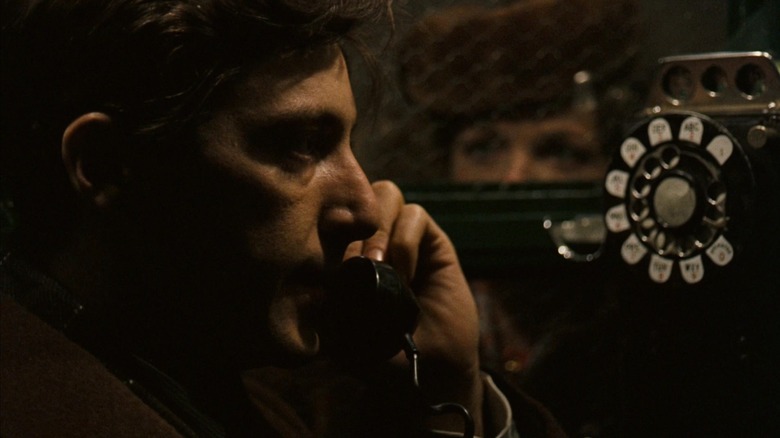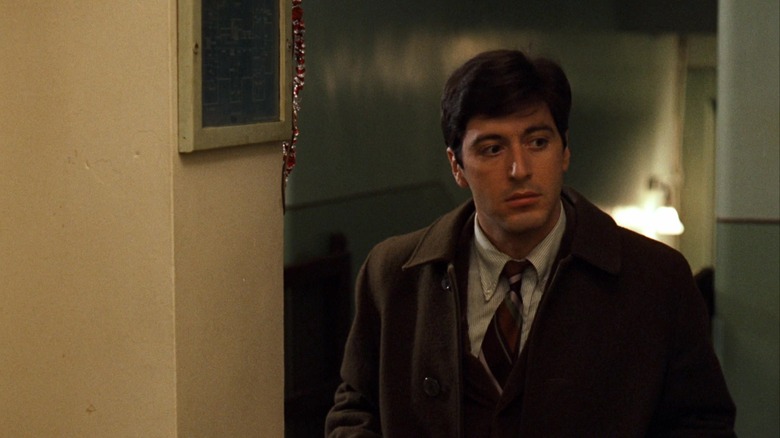The Best Crime Thriller (According To IMDb) Is An All-Time Classic
A quick look at the "IMDb Top 250 Movies" list will show that "The Godfather" is among the top five entries, sitting at #2, to be precise. If we were to filter this list by genre and choose crime thriller, Francis Ford Coppola's first entry in "The Godfather" trilogy emerges at the top, followed closely by "Part II" at the #3 spot. Although lists like this are subjective, and the crime thriller genre encompasses varying tints, this is not a controversial ranking by any means. Rightfully finding its way into conversations about the greatest American films ever made, "The Godfather" is a riveting adaptation of Mario Puzo's work which helped categorize a new mythology of organized crime on the big screen.
It is easy to dismiss Coppola's trilogy as a saga solely about mafia bosses. Although these films trace the legacy of the Corleone family, they also explore complex diasporic identities and the unsavory underbelly of the American dream. The opening of "The Godfather" presents a clash between the two, where the ideals of 1940s America are steadily reframed by the Corleone family, with Don Vito Corleone (Marlon Brando) at the peak of this newly-established power structure. Don Vito has painstakingly built an empire that favors hyper-specific values about family, masculinity, and personal revenge, and the rise of his son Michael (Al Pacino) as his successor maps the destabilization of this legacy in favor of something new.
However, the birth of something new does not always usher longevity nor aim to atone for the sins of the father. The "Godfather" hints at the beginning of the end, where the rise of Michael Corleone also assures a continuation of deeply problematic familial and cultural traditions. This includes casual, flippant sexism against women or the justification of personal justice as "business," where solemn respect for tradition goes hand-in-hand with hideously warped perceptions about what it means to be a man who is feared and respected.
The Godfather explores the paradoxical impulses of Michael Corleone
When we meet Michael for the first time during the film's opening wedding scene, he is introduced as someone completely detached from the family business. His presence at the wedding is cursory, and he seems more attached to his girlfriend, Kay (Diane Keaton), even though he is respectfully civil with his father and the family Consigliori, Tom Hagen (Robert Duvall). However, the turning point in his arc is triggered by a need for revenge, which gradually morphs into a ruthless need to be at the top and indulge in violent corruption. At the cusp of his transformation, Michael shoots his rivals (who had attempted to kill his father) point-blank: an unacceptable act that contradicts the Corleone brand of violence steered by "business," as opposed to blatant personal motivations.
This point of no return forces Michael to embark on a journey back to his roots — Sicily — where a personal loss drains his lingering kindness and re-molds him as a ruthless man who viciously upholds mafioso traditions and dismantles them at the same time. As for the Don's female children, or any Corleone women who are part of the family, they are either posited either as sources of conflict, sacrificial pawns, or completely sidelined as invisible entities.
The way Coppola infuses these narrative and subtextual nuances with dramatic gravitas and flair is extraordinary, to the point that the film serves as a blueprint for the genre in every possible way. It is an audacious undertaking that bears fruit, creating an unforgettable portrait of organized crime, personal hells, and the re-birth of a man destined to follow in his father's footsteps.

